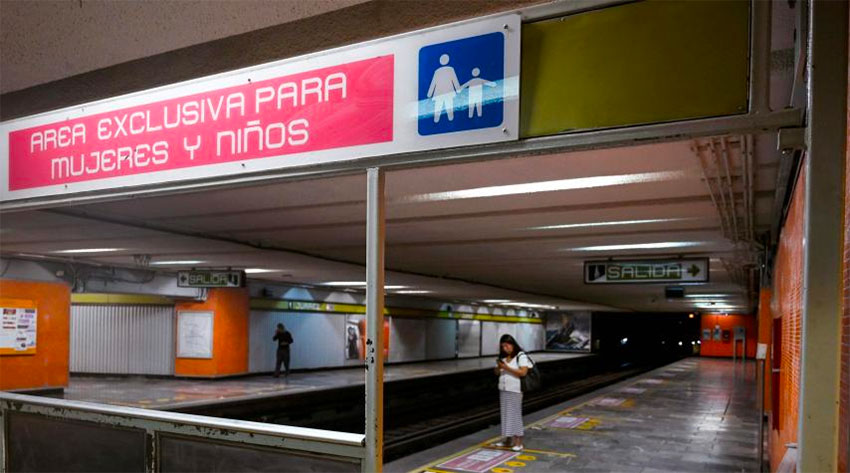Women were conspicuous by their absence on Monday as millions took part in the national women’s strike, organized to protest the high levels of gender-based violence in Mexico and demand action from the government.
A day after large numbers of women marched in cities across Mexico to mark International Women’s Day, many stayed at home on Monday to send a clear message to authorities and the nation’s men that they are fed up with machista culture and the high levels of gender violence in a country where an average of 10 females are murdered every day.
Classrooms at schools and universities, government offices, the Supreme Court, federal Congress, the Mexico City Metro, banks and streets across the nation were some of the places devoid of women and girls, or with notably lower numbers than normal.
Organizers said that the aim of the strike, dubbed #UnDíaSinNosotras (A Day Without Us) and #UnDíaSinMujeres (A Day Without Women) on social media, was to remind people that large numbers of women in Mexico disappear forever.
“It is no longer possible to continue living in a country where a woman can be murdered in a brutal way, without any consequence, and in a culture that allows for it to happen,” Lorena Wolffer, an artist and feminist activist, told The New York Times.

At the National Autonomous University (UNAM) in Mexico City, the nation’s largest tertiary education institution, faculty buildings were almost deserted, the newspaper El Financiero reported. Medicine faculty employee Cristian Pimenel described the atmosphere as “sad.”
An accounting student identified only as Nicolás declared the main UNAM campus, Ciudad Universitaria (University City), “dead,” telling the newspaper Milenio that the absence of female classmates generated an “ugly” sensation. The situation was similar at the majority of universities across the country, both public and private, with female students skipping classes in large numbers.
At the entrance to the Mariano Azuela Primary School in the Mexico City neighborhood of Navarte, a sign announced that the school was closed due to a lack of the “necessary conditions” to operate. Many other schools scrambled to cover classes, their staff depleted by the absence of female teachers.
Many municipal, state and federal female government employees – more than 60,000 in Mexico City alone – joined the strike, leaving their male colleagues to go on working without them.
“You feel a void. … It’s not just physical but also professional and moral,” said Alexis, an IT employee at the federal Interior Ministry. “Teamwork can’t be completed because we’re missing their input.”
At the Supreme Court, 95% of female employees, including three judges, stopped work on Monday, the newspaper El Economista reported. Some of the few women who did show up for work at the nation’s highest court wore purple kerchiefs in a show of solidarity with the feminist movement.
A women’s forum was scheduled to take place at the lower house of Congress, the Chamber of Deputies, but no lawmakers – female or male – showed up. A sign on the door of National Action Party Deputy Laura Rojas Hernández, the president of the lower house, simply said: “closed due to strike.”
In the Mexico City Metro, women were absent from many stations’ ticket offices, ensuring long lines to purchase tickets at recently installed machines. Train cars reserved exclusively for women were at least half empty, even in peak travel periods.
Many major banks closed hundreds of their branches on Monday due to a lack of tellers to attend to customers. BBVA shut down 53% of its 1,800 branches, Citibanamex only opened 428 out of more than 1,400 and Santander closed around half of its 1,200 banks.
“My five female colleagues didn’t come; we were overwhelmed with work,” a BBVA employee in the south of Mexico City told El Financiero.
The absence of women was also notable at President López Obrador’s regular morning news conference, with just six female journalists in attendance, according to a report by the newspaper Milenio.
The widespread participation of females in the national strike also meant less traffic on the nation’s roads, fewer social media posts by Mexican women and lighter than normal pedestrian traffic in city streets.

However, while millions responded to the call to skip their normal daily activities, many others did attend their jobs, mostly out of necessity. Doctors, nurses, lawyers, policewomen and supermarket employees were among the female workers who carried on with their regular Monday activities.
“Conviction, commitment and responsibility moves us” to continue working, said Érika Guerrero Jáuregui, deputy head of nursing at the Dr. Antonio Fraga Mouret Specialist Hospital in Mexico City.
“We can make ourselves more visible by working. … I decided to work, firstly, [out of duty] to the institution [to which I belong] and secondly because of the commitment I have to women. This is my support [to the feminist movement] – going to work to attend to other women who need my help,” she said.
Law professor Italy Desire taught her regular Monday class in Mexico City, telling Milenio: “I believe that one of the best tools women have to eradicate violence is education – so I can’t deny my students the opportunity to be here.”
Alexa Carmona, a criminal lawyer in the capital, said that she had “important trials” to attend on Monday, explaining “it’s not easy to not come and leave them for tomorrow.”
Despite her own inability to join the strike, Carmona said that she supported “all the women who decided to stay at home.”
Teresa, a juice vendor at the Cuauhtémoc market in Mexico City, succinctly summed up her decision not to join the strike, telling El Financiero: “if you don’t work, you don’t earn.”
However, the decision of millions of other women to stay away from work on Monday no doubt exacted a heavy toll on an already ailing Mexican economy. Citibanamex analysts estimated that the economy would take a 43.5-billion-peso (US $2.1 billion) hit as a result of the strike while those at BBVA forecast a more modest 34-billion-peso impact.
The absence of women from learning institutions and workplaces on Monday, and the consequent emphasis it placed on the huge contribution they make, led many Mexican men to the same conclusion, El Financiero reported: “Another day without women – please no.”
Source: El Economista (sp), El Financiero (sp), Milenio (sp)
